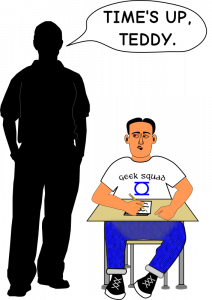
 It is the time of year when the thoughts of teachers of students in years 3, 5, 7 and 9 turn (not so) lightly to NAPLAN. I’m sure many of you are aware of the controversial review of NAPLAN by Les Perelman, a retired professor from MIT in the United States. Perelman conducted a similar review in 2005 in the US, which was influential in leading to a change in the American Scholastic Aptitude Tests (SATs). At the time, Perelman published a guide on how to “ace the essay writing test” and he has produced a similar PDF text for Australia’s NAPLAN writing test. Perelman criticises the fact that NAPLAN essays are marked according to which words in a vocabulary list are included in the essay, with those words on the list rated as “Challenging” being awarded the highest marks. Perelman states that students who use these particular words, regardless of whether or not they demonstrate that they understand the meaning of the words, will score higher, and that students can thus be trained to use these words in their essays. However, Perelman also warns that if students are unsure of the spelling, then they should not use a word because of the emphasis placed on correct spelling in the marking of NAPLAN essays.
It is the time of year when the thoughts of teachers of students in years 3, 5, 7 and 9 turn (not so) lightly to NAPLAN. I’m sure many of you are aware of the controversial review of NAPLAN by Les Perelman, a retired professor from MIT in the United States. Perelman conducted a similar review in 2005 in the US, which was influential in leading to a change in the American Scholastic Aptitude Tests (SATs). At the time, Perelman published a guide on how to “ace the essay writing test” and he has produced a similar PDF text for Australia’s NAPLAN writing test. Perelman criticises the fact that NAPLAN essays are marked according to which words in a vocabulary list are included in the essay, with those words on the list rated as “Challenging” being awarded the highest marks. Perelman states that students who use these particular words, regardless of whether or not they demonstrate that they understand the meaning of the words, will score higher, and that students can thus be trained to use these words in their essays. However, Perelman also warns that if students are unsure of the spelling, then they should not use a word because of the emphasis placed on correct spelling in the marking of NAPLAN essays.
 Perelman had been asked to review the planned robot-marking of NAPLAN essays in October 2017, and his criticism was so harsh that the plan was scrapped. ACARA seems to be taking Perelman’s concerns seriously. ACARA have stated that they believe that teachers focus on building and expanding the vocabulary of students and students should be able to use this vocabulary in “meaningful, constructive ways”. It seems certain that ACARA will re-evaluate the marking of NAPLAN essays in the face of these criticisms.
Perelman had been asked to review the planned robot-marking of NAPLAN essays in October 2017, and his criticism was so harsh that the plan was scrapped. ACARA seems to be taking Perelman’s concerns seriously. ACARA have stated that they believe that teachers focus on building and expanding the vocabulary of students and students should be able to use this vocabulary in “meaningful, constructive ways”. It seems certain that ACARA will re-evaluate the marking of NAPLAN essays in the face of these criticisms.
So how can teachers best help students to improve their vocabulary? Well, one way may be to study Perelman’s list, but surely there are better ways, more closely aligned to our goals of enhancing students’ understanding of words as well. It is well known (and scientifically proven) that reading improves children’s vocabulary, especially if they are reading texts which use decent vocabulary. The OpenSTEM® Understanding Our World® program, which covers the HASS + Science curriculum for the years: Foundation/Prep/Kindy to Year 6 prides itself on the vocabulary used in its resources, which cover a huge range of curriculum-aligned subjects. We maintain a reasonably high standard of vocabulary aimed at stretching students to improve their knowledge of more complex words. We encourage the concomitant use of a dictionary to ensure that students learn the meanings of these words.
 Teachers have already reported to us that they find these resources a useful addition to students’ preparations for NAPLAN. This is a wonderfully efficient use of time – while engaged in HASS or Science learning, students are actually also preparing for NAPLAN’s literacy tests, practising vital curriculum-aligned core skills that will improve their performance in NAPLAN, as well as increasing their overall educational outcomes. It really is the best of all worlds! These resources (over 200 on topics as vast as geography, indigenous peoples, explorers, Australian history, electricity, the seasons, celebrations, sport etc, etc, and including many activities) are available for free download to subscribers, or can be purchased individually, or as part of the Understanding Our World® units.
Teachers have already reported to us that they find these resources a useful addition to students’ preparations for NAPLAN. This is a wonderfully efficient use of time – while engaged in HASS or Science learning, students are actually also preparing for NAPLAN’s literacy tests, practising vital curriculum-aligned core skills that will improve their performance in NAPLAN, as well as increasing their overall educational outcomes. It really is the best of all worlds! These resources (over 200 on topics as vast as geography, indigenous peoples, explorers, Australian history, electricity, the seasons, celebrations, sport etc, etc, and including many activities) are available for free download to subscribers, or can be purchased individually, or as part of the Understanding Our World® units.
So let’s help our students to become the best they can possibly be, whilst efficiently covering the curriculum, and most importantly helping them to prepare to face the world armed with the knowledge and skills they will need in their future lives!


My grade 4 son played this with me a few times, his feedback was it was too easy but fun,…
Brad